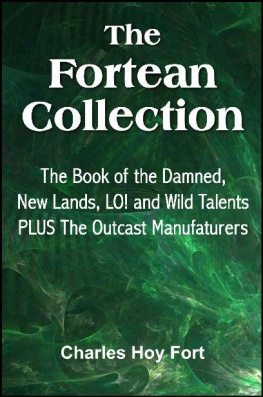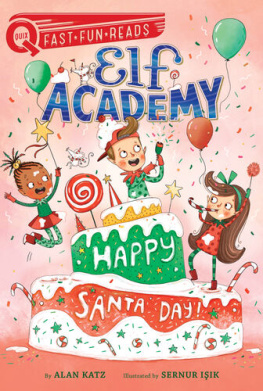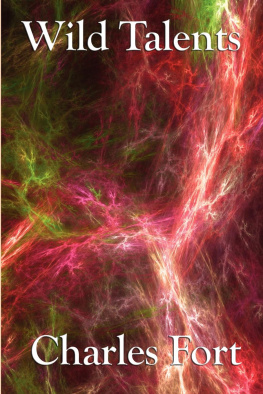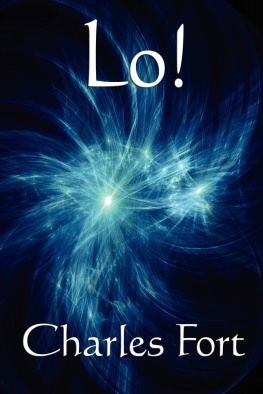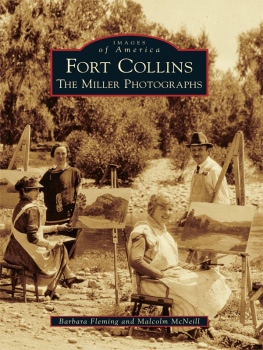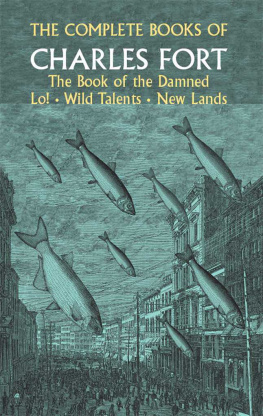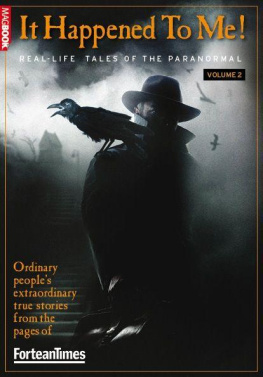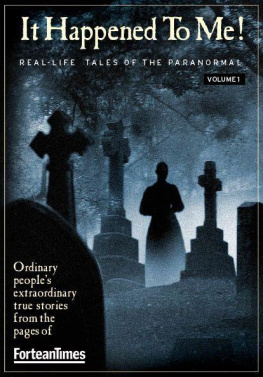All rights reserved. Printed in the United States of America. No part of this book may be used or reproduced in any manner without written permission except for brief quotations for review purposes only.
Chapter 1
A procession of the damned.
By the damned, I mean the excluded.
We shall have a procession of data that Science has excluded.
Battalions of the accursed, captained by pallid data that I have exhumed, will march. You'll read themor they'll march. Some of them livid and some of them fiery and some of them rotten.
Some of them are corpses, skeletons, mummies, twitching, tottering, animated by companions that have been damned alive. There are giants that will walk by, though sound asleep. There are things that are theorems and things that are rags: they'll go by like Euclid arm in arm with the spirit of anarchy. Here and there will flit little harlots. Many are clowns. But many are of the highest respectability. Some are assassins. There are pale stenches and gaunt superstitions and mere shadows and lively malices: whims and amiabilities. The nave and the pedantic and the bizarre and the grotesque and the sincere and the insincere, the profound and the puerile.
A stab and a laugh and the patiently folded hands of hopeless propriety.
The ultra-respectable, but the condemned, anyway.
The aggregate appearance is of dignity and dissoluteness: the aggregate voice is a defiant prayer: but the spirit of the whole is processional.
The power that has said to all these things that they are damned, is Dogmatic Science.
But they'll march.
The little harlots will caper, and freaks will distract attention, and the clowns will break the rhythm of the whole with their buffooneriesbut the solidity of the procession as a whole: the impressiveness of things that pass and pass and pass, and keep on and keep on and keep on coming.
The irresistibleness of things that neither threaten nor jeer nor defy, but arrange themselves in mass-formations that pass and pass and keep on passing.
So, by the damned, I mean the excluded.
But by the excluded I mean that which will some day be the excluding.
Or everything that is, won't be.
And everything that isn't, will be
But, of course, will be that which won't be
It is our expression that the flux between that which isn't and that which won't be, or the state that is commonly and absurdly called "existence," is a rhythm of heavens and hells: that the damned won't stay damned; that salvation only precedes perdition. The inference is that some day our accursed tatterdemalions will be sleek angels. Then the sub-inference is that some later day, back they'll go whence they came.
It is our expression that nothing can attempt to be, except by attempting to exclude something else: that that which is commonly called "being" is a state that is wrought more or less definitely proportionately to the appearance of positive difference between that which is included and that which is excluded.
But it is our expression that there are no positive differences: that all things are like a mouse and a bug in the heart of a cheese. Mouse and a bug: no two things could seem more unlike. They're there a week, or they stay there a month: both are then only transmutations of cheese. I think we're all bugs and mice, and are only different expressions of an all-inclusive cheese.
Or that red is not positively different from yellow: is only another degree of whatever vibrancy yellow is a degree of: that red and yellow are continuous, or that they merge in orange.
So then that, if, upon the basis of yellowness and redness, Science should attempt to classify all phenomena, including all red things as veritable, and excluding all yellow things as false or illusory, the demarcation would have to be false and arbitrary, because things colored orange, constituting continuity, would belong on both sides of the attempted borderline.
As we go along, we shall be impressed with this:
That no basis for classification, or inclusion and exclusion, more reasonable than that of redness and yellowness has ever been conceived of.
Science has, by appeal to various bases, included a multitude of data. Had it not done so, there would be nothing with which to seem to be. Science has, by appeal to various bases, excluded a multitude of data. Then, if redness is continuous with yellowness: if every basis of admission is continuous with every basis of exclusion, Science must have excluded some things that are continuous with the accepted. In redness and yellowness, which merge in orangeness, we typify all tests, all standards, all means of forming an opinion
Or that any positive opinion upon any subject is illusion built upon the fallacy that there are positive differences to judge by
That the quest of all intellection has been for somethinga fact, a basis, a generalization, law, formula, a major premise that is positive: that the best that has ever been done has been to say that some things are self-evidentwhereas, by evidence we mean the support of something else
That this is the quest; but that it has never been attained; but that Science has acted, ruled, pronounced, and condemned as if it had been attained.
What is a house?
It is not possible to say what anything is, as positively distinguished from anything else, if there are no positive differences.
A barn is a house, if one lives in it. If residence constitutes houseness, because style of architecture does not, then a bird's nest is a house: and human occupancy is not the standard to judge by, because we speak of dogs' houses; nor material, because we speak of snow houses of Eskimosor a shell is a house to a hermit crabor was to the mollusk that made itor things seemingly so positively different as the White House at Washington and a shell on the seashore are seen to be continuous.
So no one has ever been able to say what electricity is, for instance. It isn't anything, as positively distinguished from heat or magnetism or life. Metaphysicians and theologians and biologists have tried to define life. They have failed, because, in a positive sense, there is nothing to define: there is no phenomenon of life that is not, to some degree, manifest in chemism, magnetism, astronomic motions.
White coral islands in a dark blue sea.
Their seeming of distinctness: the seeming of individuality, or of positive difference one from anotherbut all are only projections from the same sea bottom. The difference between sea and land is not positive. In all water there is some earth: in all earth there is some water.
So then that all seeming things are not things at all, if all are inter-continuous, any more than is the leg of a table a thing in itself, if it is only a projection from something else: that not one of us is a real person, if, physically, we're continuous with environment; if, psychically, there is nothing to us but expression of relation to environment.
Our general expression has two aspects:
Conventional monism, or that all "things" that seem to have identity of their own are only islands that are projections from something underlying, and have no real outlines of their own.

